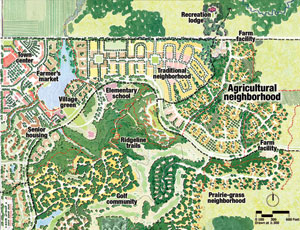What do you get when you cross a farm commune with a traditional neighborhood, a suburban subdivision and a golf community? If T. Wall Properties has its way, you get the 717-acre Bishops Bay, a planned development for the rural towns of Westport and Middleton, Wis. The scheme, if approved, would contain a 240-acre neighborhood that integrates farming with housing.
“This development can truly be a model to transform and improve the way communities are planned and the way people live,” says Andy Inman, vice president of development for the Middleton-based T. Wall Properties.
Bishops Bay would resemble other walkable, livable communities were it not for its “integrated agricultural urbanism” (IAU). If all goes according to plan, one neighborhood would have clusters of homes between tracts of land, farmed by residents and owned communally.
Instead of residents occupying homes across a fence from adjacent rectangular farm fields, as is typical with agricultural preservation, they would have a direct connection and sense of ownership as they work the fields and take part in day-to-day farm activities, says Sean O’Malley, managing principal of the Laguna Beach, Calif., office of landscape architect-planner SWA Group. He is credited with the idea for the project’s IAU.
Residents would be able to own and work deeded garden plots. They also could work linear farms and orchards for a share of the produce, and they could purchase a share of the produce. Excess fruits and vegetables would be sold in a farmers’ market in the town center and potentially throughout the area. “From what I can see, there is nothing like this yet,” says O’Malley.
The master plan by Madison-based architect Vierbicher and SWA is complete. The developer recently got land-use approval from Westport-Middleton’s joint zoning committee. The first investment offering is complete, says Inman.
Only time will tell whether the project will garner the myriad approvals still needed to proceed. Westport’s zoning committee members have “some concerns” over the loss of traditional agricultural lands, says Thomas G. Wilson, the town’s administrator. “At the same time, I believe they realize this type of housing will aid in meeting the overall goal” of the town’s comprehensive plan, which is to preserve the rural character, he adds.
The developer hopes to break ground in two to three years and finish the community in 15 to 20 years. The farm community would be built in phase one.










Post a comment to this article
Report Abusive Comment